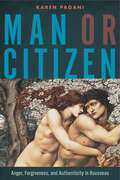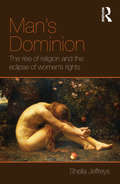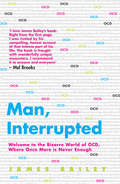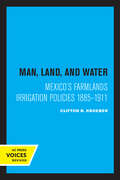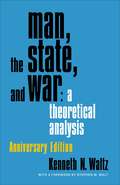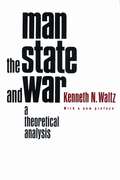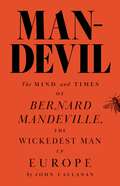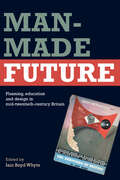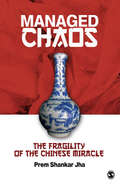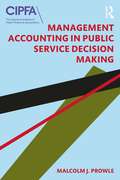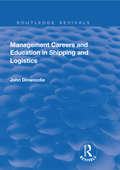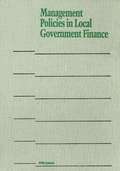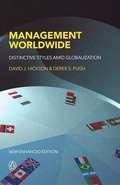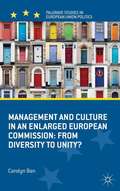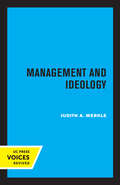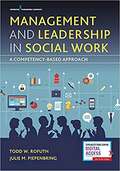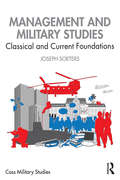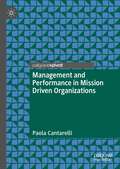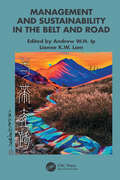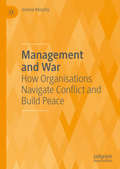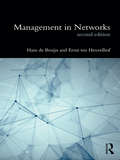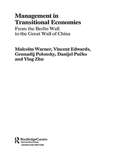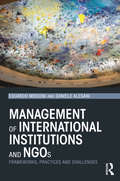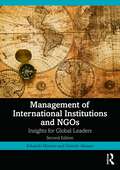- Table View
- List View
Man or Citizen: Anger, Forgiveness, and Authenticity in Rousseau (G - Reference, Information and Interdisciplinary Subjects)
by Karen PaganiThe French studies scholar Patrick Coleman made the important observation that over the course of the eighteenth century, the social meanings of anger became increasingly democratized. The work of Jean-Jacques Rousseau is an outstanding example of this change. In Man or Citizen, Karen Pagani expands, in original and fascinating ways, the study of anger in Rousseau’s autobiographical, literary, and philosophical works. Pagani is especially interested in how and to what degree anger—and various reconciliatory responses to anger, such as forgiveness—functions as a defining aspect of one’s identity, both as a private individual and as a public citizen. Rousseau himself was, as Pagani puts it, “unabashed” in his own anger and indignation—toward society on one hand (corrupter of our naturally good and authentic selves) and, on the other, toward certain individuals who had somehow wronged him (his famous philosophical disputes with Voltaire and Diderot, for example). In Rousseau’s work, Pagani finds that the extent to which an individual processes, expresses, and eventually resolves or satisfies anger is very much of moral and political concern. She argues that for Rousseau, anger is not only inevitable but also indispensable, and that the incapacity to experience it renders one amoral, while the ability to experience it is a key element of good citizenship.
Man's Dominion: The Rise of Religion and the Eclipse of Women's Rights
by Sheila JeffreysIn this feminist critique of the politics of religion, Sheila Jeffreys argues that the renewed rise of religion is harmful to women’s human rights. The book seeks to rekindle the criticism of religion as the founding ideology of patriarchy. Focusing on the three monotheistic religions; Judaism, Christianity and Islam, this book examines common anti-women attitudes such as ‘male-headship’, impurity of women, the need to control women’s bodies, and their modern manifestations in multicultural Western states. It points to the incorporation of religious law into legal systems, faith schools, and campaigns led by Christian and Islamic organisations against women’s rights at the U.N., and explains how religious rights threaten to subvert women’s rights. Including highly-topical chapters on the burka and the covering of women, and polygamy, this text questions the ideology of multiculturalism which shields religion from criticism by demanding respect for culture and faith, whilst ignoring the harm that women suffer from religion. Man’s Dominion is an incisive and polemic text that will be of interest to students of gender studies, religion, and politics.
Man, Interrupted: Welcome to the Bizarre World of OCD, Where Once More is Never Enough
by James BaileyJames Bailey's form of obsessive-compulsive disorder (OCD) was as bizarre as it was unbearable. He was obsessed by a fear of drugs and their effects, believing himself to be in constant danger of becoming insanely high through people spiking his food, or even by just touching a photograph of a marijuana leaf.The treatment programme he went through at a specialist American clinic was challenging, to say the least. He was asked to shake hands and mingle with the local junkies, fighting his anxieties and the urge to go and wash for as long as possible in order to 'expose' himself to his fears.Man, Interrupted gives us a glimpse into the tortured world of a man suffering from what is an increasingly common disorder. But far from being a doom-laden account of mental illness, the result is uniquely revealing, hilariously entertaining and wonderfully rewarding.
Man, Land, and Water: Mexico's Farmlands Irrigation Policies 1885-1911
by Clifton KroeberThis title is part of UC Press's Voices Revived program, which commemorates University of California Press’s mission to seek out and cultivate the brightest minds and give them voice, reach, and impact. Drawing on a backlist dating to 1893, Voices Revived makes high-quality, peer-reviewed scholarship accessible once again using print-on-demand technology. This title was originally published in 1983.
Man, the State, and War: A Theoretical Analysis
by Kenneth WaltzWhat are the causes of war? How might the world be made more peaceful? In this landmark work of international relations theory, first published in 1959, the eminent realist scholar Kenneth N. Waltz offers a foundational analysis of the nature of conflict between states. He explores works by both classic political philosophers, such as St. Augustine, Hobbes, Kant, and Rousseau, and modern psychologists and anthropologists to discover ideas intended to explain war among states and related prescriptions for peace. Waltz influentially distinguishes among three “images” of the origins of war: those that blame individual leaders or human nature, those rooted in states’ internal composition, and those concerning the structure of the international system. With a foreword by Stephen M. Walt on the legacy and continued relevance of Waltz’s work, this anniversary edition brings new life to a perennial international relations classic.
Man, the State, and War: A Theoretical Analysis
by Kenneth WaltzWhat are the causes of war? To answer this question, Professor Waltz examines the ideas of major thinkers throughout the history of Western civilization. He explores works both by classic political philosophers, such as St. Augustine, Hobbes, Kant, and Rousseau, and by modern psychologists and anthropologists to discover ideas intended to explain war among states and related prescriptions for peace.
Man-Devil: The Mind and Times of Bernard Mandeville, the Wickedest Man in Europe
by John J. CallananA lively and provocative account of Bernard Mandeville and the work that scandalized and appalled his contemporaries—and made him one of the most influential thinkers of the eighteenth centuryIn 1714, doctor, philosopher and writer Bernard Mandeville published The Fable of the Bees, a humorous tale in which a prosperous hive full of greedy and licentious bees trade their vices for virtues and immediately fall into economic and societal collapse. Outrage among the reading public followed; philosophers took up their pens to refute what they saw as the fable&’s central assertion. How could it be that an immoral community thrived but the introduction of morality caused it to crash and burn? In Man-Devil, John Callanan examines Mandeville and his famous fable, showing how its contentious claim—that vice was essential to the economic flourishing of any society—formed part of Mandeville&’s overall theory of human nature. Mandeville, Callanan argues, was perfectly suited to analyze and satirize the emerging phenomenon of modern society—and reveal the gap between its self-image and its reality.Callanan shows that Mandeville&’s thinking was informed by his medical training and his innovative approach to the treatment of illness with both physiological and psychological components. Through incisive and controversial analyses of sexual mores, gender inequality, economic structures, and political ideology, Mandeville sought to provide a naturalistic account of human behavior—one that put humans in close continuity with animals. Aware that his fellow human beings might find this offensive, he cloaked his theories in fables, poems, anecdotes, and humorous stories. Mandeville mastered irony precisely for the purpose of making us aware of uncomfortable aspects of our deepest natures—aspects that we still struggle to acknowledge today.
Man-Made Future: Planning, Education and Design in Mid-20th Century Britain
by Iain Boyd WhyteThis anthology of essays by a group of distinguished scholars investigates post-1945 city planning in Britain; not from a technical viewpoint, but as a polemical, visual and educational phenomenon, shifting the focus of scholarly interest towards the often-neglected emotional and aesthetic aspects of post-war planning. Each essay is grounded in original archival research and sheds new light on this critical era in the development of modern town planning. This collection is a valuable resource for architectural, social and urban historians, as well as students and researchers offering new insights into the development of the mid-twentieth century city.
Managed Chaos: The Fragility of the Chinese Miracle
by Prem Shankar JhaManaged Chaos: The Fragility of the Chinese Miracle reads into the Chinese politics and economy and the disparate status and position of the two domains. On one hand, its economy has sustained a near 10 per cent growth rate for 30 years, while, on the other, trapped in an incomplete transition from a totalitarian to a democratic market economy, politically the country is still considered a fragile state. This book helps the reader resolve this incongruity through its inference. The defining features of this book are: - Armed with an original application of Michal Kalecki’s theory of intermediate regimes, it provides an explanation of China’s explosive growth. - It indicates the formation of a new stratum, through winding up of centralised planning, the stratum of ‘proto-bourgeoisie’, consisting of the local cadres of the communist party, who can counter the central cadres for capturing investible resources of the state. - It creates a single politic-economic model that explains China’s economic and political development. The causal connections in the model make it possible to predict China’s future, and the challenges it faces. This book makes a significant contribution to the literature on Chinese political economy over the past three decades. It is a must read for all discerning and informed readers. It will also be valuable for policy makers and students and researchers working in the areas of international relations, Chinese studies and political economy.
Management Accounting in Public Service Decision Making
by Malcolm J. ProwleRadical changes to public service delivery have swept across many regions of the world. Management accounting methods are vital to support operational and strategic decision making in public services internationally. This book provides a comprehensive and “leading-edge” guide to the topic. Written by an expert scholar with practical experience of public service delivery, the book takes account of key trends such as increased demand for public services, financial austerity, technological change and enhanced performance management. A globally relevant book, informed by cutting edge academic research and benefitting from integrated case studies, this is essential reading for both students and practitioners involved with the financial aspects of public services management.
Management Careers and Education in Shipping and Logistics (Routledge Revivals)
by John DinwoodieThis title was first published in 2000. This investigation into why aspiring managers chose to study shipping and logistics in the UK uniquely discusses the issues which influenced their academic and career choices. It catalogues the attractions and deterrents to advanced study in an industry needing more highly skilled practitioners. Qualitative, quantitative and mapping approaches to modelling the vocational study decision are reported, along with a unique comparison of students’ cognitive maps.
Management Policies in Local Government Finance (5th edition)
by J. Richard Aronson Eli SchwartzWritten for all practitioners of local government finance, ICMA¿s Management Policies in Local Government Finance has long been considered the most comprehensive, most on-target text for local government managers, finance directors, and economic development planners and directors. Now in its fifth edition, this classic on financial management will help you: Develop new revenue sources Design a budget process that includes performance reporting Conduct strategic economic development Understand debt management and bond sales Use modern information systems to improve financial decisions Meet the day-to-day challenges of financial management, from procurement to labor negotiations. Completely new chapters in this revised edition address school finance, cost-benefit analysis, enterprise resource management systems, procurement, cash and investment management, and risk and insurance management. All chapters have been thoroughly updated to reflect changes in federal and state practice, new professional guidelines, and underlying changes in global and national economies.
Management Worldwide: Distinctive Styles Among Globalization
by Derek S. Pugh David J. HicksonBusinesses today need employees who can operate on a global stage, whether as international managers, technical specialists, expatriates or 'parachutists' who make occasional troubleshooting trips abroad. Yet cultural misunderstandings in the workplace can complicate even the simplest tasks. Something that sounds like a 'Yes' to a foreigner may actually be a polite way of saying 'No'. Fully updated and expanded for this second edition, Management Worldwide is essential for managers, students ofmanagement and organizations who want to know how managers operate and business is conducted in different societies. It is essential reading in a global economy where cultural differences can still mean make or break.
Management and Culture in an Enlarged European Commission
by Carolyn BanThis book explores how the European Commission faced the challenge of enlargement. Based on extensive interviews, the work provides a lively and readable picture of life within the Commission, exploring how thousands of newcomers were recruited and socialized and how they changed the organization, including its gender balance.
Management and Ideology: The Legacy of the International Scientific Management Movement
by Judith A. MerkleFrom its obscure beginning as a system for organizing machine shops, Scientific Management has grown into the major technocratic ideology of the twentieth century. Its development and international diffusion have influenced industrial productivity, the social fabric of industrial society, and even the nature of government. In this study of the movement's growth, Merkle compares the writings of the American, German, French, British, and Soviet vanguards of Scientific Management and finds that those who advocated efficiency engineering were considerably more than pragmatists seeking immediate technical solutions to production problems. Rather, they were visionaries who sought to reconcile class conflict, restructure government, and create a universal technocratic utopia by achieving efficient mass production and rationalized distribution. The call for a "mental revolution," which permeates their writings, found sympathizers among capitalists and socialists alike; that revolution affected not only the structure of modern industrialism but also the organization of the state itself. This title is part of UC Press's Voices Revived program, which commemorates University of California Press's mission to seek out and cultivate the brightest minds and give them voice, reach, and impact. Drawing on a backlist dating to 1893, Voices Revived makes high-quality, peer-reviewed scholarship accessible once again using print-on-demand technology. This title was originally published in 1980.
Management and Leadership in Social Work: A Competency-based Approach
by Todd W. Rofuth Julie PiepenbringFull of expert guidance on leadership and management, this unique book is geared specifically to the needs of social work administrators, educators and practitioners in both academic and agency settings. The contents are fully comprehensive and encompass both theoretical approaches to management and leadership plus a wide variety of practical strategies that can be directly applied to practice. <p><p> Topics blend the art and science of leadership and management and incorporate all competencies and practice behaviors required by Network for Social Work Management (NSWM) and Council on Social Work Education (CSWE). These include understanding different leadership styles, practicing self-reflection and self-care, methods to motivate teams and mentor others, developing strategic plans, understanding financial management, marketing, fundraising, human resources, program evaluations, community collaboration, and much more. Additionally, the text illustrates the parallels/disparities between social work practice skills, knowledge, and ethics, and those of leadership and management. Instructor resources include PowerPoints for each chapter, lecture notes, and sample syllabi. Print version of the book includes free, searchable, digital access to entire contents. <p><p> KEY FEATURES: <p><p> Geared specifically to the needs of social work educators and practitioners in academic and agency settings Incorporates all competencies and practice behaviors required by NSWM and CSWE as cited in each chapter Discusses the differences between management and leadership along with best practices Fosters knowledge and skill development through the use of competency-based real-life cases, self-reflective exercises, and thought-provoking questions Offers examples of how to motivate and work with different age cohorts, community groups, and other stakeholders Addresses the challenges of financial management and fundraising Exhibits specific problem-solving and decision-making strategies
Management and Military Studies: Classical and Current Foundations (Cass Military Studies)
by Joseph SoetersThis book connects findings and insights authored by famous scholars in management and organization studies with challenges the military is facing today. One assumes that management and organization studies is only about the rational, predictable, and manageable, and that military action is predominately irrational, unpredictable, and unmanageable; both assumptions are wrong. This book argues that the discipline of management and organization studies is highly relevant for the military in both peace- and wartime conditions, and for any situation in between. In all conditions, the giant and complex military organization needs to be structured, processed, administrated, led, and accounted for. Each chapter presented in this volume focuses on the contributions of founding thinkers in management and organization studies, with their work translated and applied to the military setting. These scholars are drawn from a variety of backgrounds, including organizational sociology, economics, political science, psychology, and engineering. Although the work of only a few explicitly refers to the military, the contributions of all these scholars are relevant in order to come to grips with security and military affairs. Together with many other academics’ work, the contributions of these 18 scholars constitute the core of the field of management and organization studies. This book will be of much interest to students of military studies, management studies, and organization studies.
Management and Performance in Mission Driven Organizations
by Paola CantarelliManagement scholars worldwide increasingly capitalize on theoretical models and research designs from the behavioural sciences to close the implementation gap in mission-driven organisations. This book aims at synthesising the theoretical frameworks and evidence that has flourished over the past decades in order to advance the scholarly debate and the implications for practice in the domains of performance management, information systems, investments strategies, people administration, and change and innovation. It provides meaningful insights to tackle real-world challenges that organizations and their managers face on a daily basis; including why two managers can make radically different decisions in front of the same information, which cognitive traps most often get in the way of good performance management, and how managerial interventions can limit such errors and variability.
Management and Sustainability in the Belt and Road
by Andrew W. H. Ip Lianne K. W. LamChina’s Belt and Road Initiatives (BRI) is an ambitious infrastructure project conceived in 2013 by President Xi Jinping with development and investment initiatives stretching from Asia and Europe that reflect the original Silk Road with business networks through countries such as Afghanistan, Kazakhstan, Kyrgyzstan, Tajikistan, Turkmenistan, and Uzbekistan, as well as India and Pakistan, spanning a route of more than 4,000 miles and history that can be dated back more than 2,200 years. Given the background of China’s unique approach in fighting COVID-19, and against the backdrop of sluggish economic growth, innovation, and management, sustainable development of BRI will be the key and the driving force for the post-pandemic economic recovery of many countries, especially as BRI countries now account for nearly 30% of China’s foreign trade and 15% of outward direct investment. The vision to create a vast network of railways, energy pipelines, highways, and streamlined border crossings to expand the international use of Chinese currency and improve connectivity to China is good foresight and proved fortuitous when the COVID-19 pandemic came to plague the world, and amid the conflicts between the United States and China as well as the war between Russia and Ukraine. Since the inception of BRI, many books have been written to cover topics ranging from globalization to detailing how China’s business and politics are a major motivation for China’s overseas economic activities with case studies and practices, yet few of these books provide a structured approach to the sustainable management of BRI projects. This book is about how to manage the innovation, sustainability, and business necessary to make BRI work and how to handle the issues, problems, and crises that may arise in the process. Participants of BRI projects can take on many different roles, but ultimately, it is team effort and leadership that creates successful projects. Here, readers will find guidelines and insights to survive and prosper in a myriad of BRI opportunities and risks. Most important of all, this book provides a glimpse of different approaches for success in BRI projects, including sustainability, environmental issues, social and political aspects, technology, choice of industry, project management, education and training, governance, and many more.
Management and War: How Organisations Navigate Conflict and Build Peace
by Joanne MurphyWar and conflict are a reality of life throughout the world. While much is written about the impact of violence and disorder, how people and organisations adapt to these environments is poorly understood. This book tells the often hidden story of people managing, delivering services and sustaining economies through and beyond violent conflict. It is written for both general readers and academic specialists, combining first person interviews, insights from ‘witness seminars; and informal conversations with more scholarly research. Building on what we already know about organisational behavior and conflict transformation, the book looks at the delivery of housing and public amenities, the management of public space and commemoration and the role of local businesses during and beyond violent conflict. In particular, it focuses on the role of organisational managers as peacebuilding entrepreneurs, generating and sustaining conflict transformation efforts.
Management in Networks: On Multi-actor Decision Making
by Ernst Ten Heuvelhof Hans De BruijnGetting what you want – even if you are the boss – isn’t always easy. Almost every organization, big or small, works among a network of competing interests. Whether it’s governments pushing through policies, companies trying to increase profits, or even families deciding where to move house, rarely can decisions be made in isolation from competing interests both within the organization and outside it. In this accessible and straightforward account, Hans de Bruijn and Ernst ten Heuvelhof cast light on multi-stakeholder decision-making. Using plain language, they reveal the nuts and bolts of decision-making within the numerous dilemmas and tensions at work. Drawing on a diverse range of illustrative examples throughout, their perceptive analysis examines how different interests can either support or block change, and the strategies available for managing a variety of stakeholders. The second edition of Management in Networks incorporates a wider spread of international cases, a new chapter giving an overview of different network types, and a new chapter looking at digital governance and the impact of big data on networks. This insightful text is invaluable reading for students of management and organizational studies, plus practitioners – or actors – operating in a range of contexts.
Management in Transitional Economies: From the Berlin Wall to the Great Wall of China
by Ying Zhu Malcolm Warner Vincent Edwards Gennadij Polonsky Danijel PuckoBased on extensive research, this comparative study examines the past, present and future of management in the transitional economies of East and Central Europe, Russia, the People's Republic of China, and Vietnam. It discusses the nature of the transition process, identifying different transition paths, highlighting common features and outlining useful theoretical approaches. Each chapter covers a wide range of aspects of management in the countries covered, including details of the historical and cultural background, the transition process, and both external and internal factors, and the macro and micro situation. Its multidisciplinary approach, makes this book suitable for both a practitioner and an academic readership
Management of Health Risks from Environment and Food
by Hajime SatoThis book examines the policy and politics of two health risks, which have recently become prominent social issues in many countries. One is the issue of asbestos as an environmental risk to humans, and another is that of bovine spongiform encephalitis (BSE), or mad cow disease as an animal disease, and of its variant Creutzfeldt-Jakob disease (CJD) as a human food risk. Employing a set of analytical frameworks in political science, each case study explores how the issues emerged, agendas got set, alternatives were chosen, and policies were implemented. Through the analysis, it is examined how safety and public reassurance were pursued in the countries studied (Japan, the UK, France the USA, and Korea). Exploration of the successes and failures in their efforts discloses the key elements to successful health risk management.
Management of International Institutions and NGOs: Frameworks, practices and challenges
by Eduardo Missoni Daniele AlesaniInternational Institutions (IIs), International NGOs (INGOs) and Transnational Hybrid Organizations (THOs) play a hugely important role in the modern world economy. Despite having been studied by scholars from a range of disciplines, these organizations have never before been approached from a management perspective. This ambitious book analyzes the management challenges associated with international cooperation and sheds light on how these organizations have evolved as the political, economic and business environments have changed around them. Covering an admirably broad canvas, the authors pursue two main objectives. Firstly, they explore the main management frameworks developed in the context of the corporate and national public/non-profit organizations and adapt them to the specificity of IIs and INGOs. This leads to the identification of a "tailored" approach to IO management based on their institutional and operational settings, stakeholder groups, core business, staff profile, and financial arrangements. Secondly, they "bring theory into practice" by linking frameworks to several case studies and best practices of organizations currently experimenting with management systems and tools, with case studies including the World Bank and the Gates Foundation. This comprehensive textbook is a must-own resource for students and academics involved with studying and working with international organizations.
Management of International Institutions and NGOs: Insights for Global Leaders
by Eduardo Missoni Daniele AlesaniThis second edition of Management of International Institutions and NGOs covers all key topics in global governance from a unique management perspective. It analyzes the management challenges associated with international cooperation rather than the more commonly explored political or economic lenses. This text is structured to enable students to connect theory with practice, beginning with the main management frameworks developed in the context of corporate and national public/nonprofit organizations and adapting them to the specificity of international institutions and international non-governmental organizations. This leads to the identification of a “tailored” approach to international organization management based on their institutional and operational settings, stakeholder groups, core business, staff profiles, and financial arrangements. The authors then connect this theory with practice by linking frameworks to several case studies and best practices of organizations currently experimenting with management systems and tools, with case studies including the World Bank and the Gates Foundation. This edition has been extensively revised and updated, with an expanded conceptual framework inclusive of systemic theories of organization, new cases throughout, and new chapters on leadership, supply chain and operations, and human-centered digitization. This comprehensive textbook is a must-own resource for students and academics involved with studying and working with international organizations.
